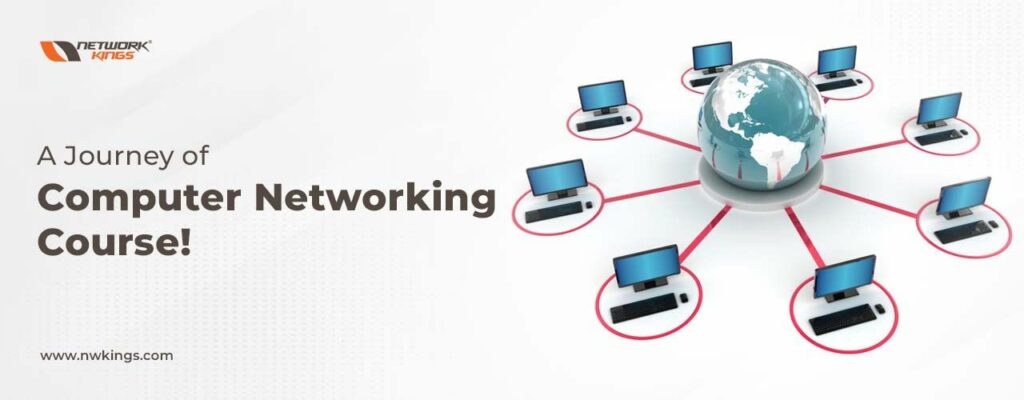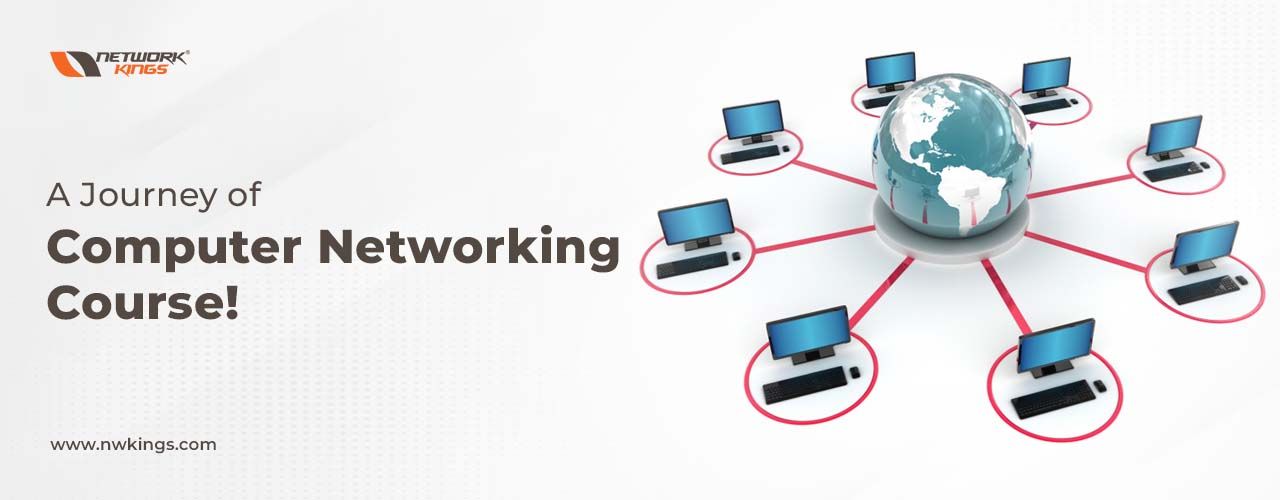
Are you looking for the best computer networking courses to excel in IT? In today’s digital age, computer networking has become an essential aspect of our daily lives. From the internet we use to access information to the devices we connect to, computer networking plays a crucial role in ensuring seamless communication and data transfer. If you’re looking to enhance your knowledge and skills in this field, computer networking courses can be an excellent way to get started.
In this blog post, we will explore various computer networking courses, their details, and the best online options available.
What is Computer Networking?
Computer networking can be defined as the practice of connecting computers and other devices to facilitate communication and data transfer. It involves using hardware devices such as routers, switches, and modems, as well as software protocols that govern how data is transmitted and received.
What are the types of Networks?
There are several kinds of networks, each serving a different purpose.
- Local area networks (LANs) are used to connect devices within a limited geographical area, such as a home or office.
- Wide area networks (WANs) connect multiple LANs over a larger geographical area, often using public or private telecommunications networks.
- Metropolitan area networks (MANs) cover a larger area than LANs but smaller than WANs, typically serving a city or metropolitan area.
- Finally, there are also wireless networks, which use radio waves to connect devices without the need for physical cables.
Understanding Computer Networking Courses:
Computer networking courses are designed to provide individuals with the knowledge and skills required to build, maintain, and secure computer networks. These courses cover a wide range of topics, from the fundamentals of networking to advanced concepts like network security and cloud computing. Whether you’re a beginner or an experienced professional looking to expand your skill set, computer networking courses can help you stay ahead in the ever-evolving IT industry.
Benefits of Online Computer Networking Courses:
Online computer networking courses offer several advantages over traditional classroom-based learning. Here are some key benefits:
- Flexibility: Online courses give you the comfort of learning at your own pace and schedule. You can access the course materials and lectures anytime, anywhere, making it convenient for working professionals or individuals with busy schedules.
- Cost-effective: Online courses often have lower course fees compared to traditional classroom-based courses. Additionally, you save on commuting expenses and study materials as most resources are provided online.
- Interactive Learning: Many online courses provide interactive learning experiences through virtual labs, simulations, and real-world case studies. This hands-on approach helps you apply theoretical knowledge to practical scenarios, enhancing your understanding of computer networking concepts.
- Global Reach: Online courses eliminate geographical barriers, allowing you to learn from renowned instructors and experts from around the world. This global perspective can broaden your understanding of computer networking practices and trends.
Free Online Computer Networking Courses with Certificates:
If you’re on a budget or want to explore computer networking without committing financially, several free online courses offer certificates upon completion. These certificates can be valuable in addition to your resume
Here, are some of the FREE Computer Networking courses Provided By Network Kings.
Best Computer Networking Courses to Become IT Pro:
While free courses are a great starting point, investing in a comprehensive computer networking course can provide you with in-depth knowledge and practical skills needed for a successful career in this field.
Here are some of the best online computer networking courses available:
- CCNA (Cisco Certified Network Associate)
The CCNA certification is an entry-level course offered by Cisco, one of the leading networking equipment providers. It covers the fundamentals of network infrastructure and prepares individuals for a wide range of networking roles.
Topics covered in CCNA Training:
The CCNA course curriculum includes topics such as network fundamentals, network access, IP connectivity, IP services, security fundamentals, and automation and programmability.
By obtaining the CCNA certification, you demonstrate your ability to install, configure, operate, and troubleshoot small to medium-sized networks.
- CCNP Enterprise (Cisco Certified Network Professional Enterprise)
Building upon the foundation of CCNA, the CCNP Enterprise certification is designed for networking professionals who aim to advance their careers in enterprise networking.
Topics covered in CCNP Training:
This CCNP course provides in-depth knowledge of advanced networking concepts, including implementing and operating enterprise networks, troubleshooting, and optimizing network performance. The CCNP Enterprise certification validates your skills in areas such as dual-stack architecture, virtualization, infrastructure, network assurance, security, and automation.
- CCNP Data Center (Cisco Certified Network Professional Data Center)
For those interested in specializing in data center networking, the CCNP Data Center certification is an ideal choice. The CCNP Data course focuses on designing, implementing, and managing data center infrastructure using Cisco technologies.
Topics covered in CCNP Data Center training:
Key topics covered in this course include data center infrastructure design, unified computing, storage networking, automation, and application-centric infrastructure.
By obtaining the CCNP Data Center certification, you showcase your expertise in handling complex data center environments.
- SD-WAN (Software-Defined Wide Area Network)
SD-WAN is a rapidly evolving technology that simplifies the management and operation of wide-area networks (WANs) by decoupling the network hardware from its control mechanism.
Topics Covered in SD-WAN Training:
This course provides a comprehensive understanding of SD-WAN architecture, deployment models, security considerations, and troubleshooting techniques.
By mastering SD-WAN concepts, you can effectively optimize network performance and reduce costs for organizations with geographically dispersed locations.
- OSPF-BGP-MPLS (Open Shortest Path First – Border Gateway Protocol – Multiprotocol Label Switching)
OSPF, BGP, and MPLS are key protocols used in large-scale networks to ensure efficient routing and traffic management.
Topics Covered in OSPF-BGP-MPLS Training:
This course delves into the intricacies of OSPF, BGP, and MPLS protocols, covering topics such as protocol operation, configuration, route redistribution, route filtering, and VPN implementations.
By acquiring expertise in these protocols, you can design and implement robust and scalable networks.
- Python for Network Engineers
Python has become a popular programming language in the networking domain due to its simplicity and versatility. This course focuses on teaching Python programming specifically tailored for network engineers.
Topics Covered in Python for Network Engineer Training:
You will learn how to automate network tasks, perform network device configuration and monitoring, and leverage various Python libraries and frameworks for network management. Python for Network Engineers empowers you to streamline network operations and improve efficiency.
- DevNet Associate
The DevNet Associate certification is designed for individuals who want to combine their networking skills with software development expertise. This course equips you with the foundational knowledge required to develop applications and automate network operations using Cisco platforms and APIs.
By acquiring a DevNet Associate certification, you demonstrate your ability to build basic applications using Cisco technologies and contribute to the digital transformation of network infrastructures.
- CCIE Enterprise (Cisco Certified Internetwork Expert Enterprise)
Considered one of the most prestigious certifications in the networking industry, the CCIE Enterprise focuses on expert-level knowledge of enterprise networking technologies.
Topics Covered in CCIE Enterprise Training:
This course covers advanced topics such as network design principles, network security, automation tools and techniques, virtualization technologies, and troubleshooting complex network issues.
By obtaining a CCIE Enterprise certification, you establish yourself as a highly-skilled network professional capable of designing and managing enterprise-scale networks.
- CCNP Security (Cisco Certified Network Professional Security)
With the increasing prevalence of cyber threats, network security has become a critical aspect of any organization’s IT infrastructure. The CCNP Security certification equips you with comprehensive knowledge of network security concepts and technologies.
Topics Covered in CCNP Security Training:
This course covers topics such as secure access, VPNs, firewalling, intrusion prevention systems (IPS), secure routing and switching infrastructure, and advanced threat protection techniques.
By becoming CCNP Security certified, you demonstrate your ability to secure networks against evolving threats.
- CCIE Security (Cisco Certified Internetwork Expert Security)
The CCIE Security certification is an expert-level course that validates your proficiency in designing and implementing complex security solutions.
Topics Covered in CCIE Security Training:
This course covers topics such as advanced threat protection architectures, secure connectivity solutions, identity management systems, intrusion prevention systems (IPS), and secure network access control mechanisms.
By obtaining a CCIE Security certification, you establish yourself as an elite security professional capable of protecting organizations against sophisticated cyber threats.
- CCIE Data Center (Cisco Certified Internetwork Expert Data Center)
The CCIE Data Center certification focuses on expert-level knowledge of data center networking technologies and best practices.
Topics Covered in CCIE Data Center Training:
This course covers topics such as data center infrastructure design, storage networking, compute platforms, fabric infrastructure, automation tools and techniques, and troubleshooting complex data center environments.
By obtaining a CCIE Data Center certification, you demonstrate your ability to architect and manage state-of-the-art data center infrastructures.
- CCIE DevNet (Cisco Certified Internetwork Expert DevNet)
The CCIE DevNet certification is aimed at individuals who combine their networking expertise with software development skills to create innovative solutions for network automation and programmability.
Topics Covered in CCIE DevNet Training:
This course covers advanced topics such as software-defined networking (SDN), network programmability foundations, automation frameworks and tools, DevOps methodologies, and cloud platform integration.
By becoming a CCIE DevNet certified professional, you showcase your ability to drive network innovation through software development.
- CCNP Service Provider (Cisco Certified Network Professional Service Provider)
The CCNP Service Provider certification is designed for professionals working in service provider environments who are responsible for managing network infrastructure and services.
Topics Covered in the CCNP Service Provider Training:
This course covers topics such as service provider architecture design, IP/MPLS core routing technologies, service provider VPN solutions, QoS mechanisms for service providers, multicast routing protocols, and network automation for service providers.
By obtaining a CCNP Service Provider certification, you demonstrate your expertise in delivering reliable and scalable services in service provider networks.
- CCIE Wireless (Cisco Certified Internetwork Expert Wireless)
The CCIE Wireless certification focuses on expert-level knowledge of wireless networking technologies and their implementation in enterprise environments.
Topics Covered in CCIE Wireless Training:
This course covers topics such as WLAN design principles, wireless security mechanisms, mobility services integration, wireless infrastructure optimization techniques, and troubleshooting complex wireless networks.
By obtaining a CCIE Wireless certification, you establish yourself as an authority in wireless networking technologies.
- CompTIA Network+
The CompTIA Network+ certification is vendor-neutral and provides a solid foundation in networking concepts applicable across various technology platforms.
Topics Covered in CompTIA Network+ Training:
This course covers topics such as network architecture, network operations, network security fundamentals, troubleshooting methodology, wireless technologies, cloud computing basics, and virtualization concepts.
By obtaining the CompTIA Network+ certification, you demonstrate your competence in essential networking skills required by organizations across different industries.
- Network Security
Network security is a critical aspect of modern-day IT infrastructure management. This course focuses on various aspects of securing networks against cyber threats by covering topics such as firewalls, intrusion detection systems (IDS), virtual private networks (VPNs), network traffic analysis tools, secure remote access mechanisms, wireless network security considerations, and incident response procedures.
By gaining expertise in network security concepts, you can help organizations protect their valuable data assets from unauthorized access.
- Cybersecurity
Cybersecurity is an ever-evolving field that addresses the protection of information systems from unauthorized access or damage caused by cyber threats. This course provides a comprehensive understanding of cybersecurity principles by covering topics such as threat intelligence analysis, vulnerability assessment techniques, security operations center (SOC) operations management, incident response planning and execution methodologies, cryptography basics, and ethical hacking fundamentals.
By acquiring cybersecurity skills, you can play a crucial role in safeguarding organizations against cyberattacks.
What skills will you learn in the Computer Networking Courses?
In computer networking courses, you will learn various skills related to networking technologies, protocols, and practices. Some of the skills you can expect to learn are:
- Understanding network architectures and topologies
- Configuring and managing network devices such as routers, switches, and firewalls
- Implementing IP addressing and subnetting
- Setting up and troubleshooting local area networks (LANs) and wide area networks (WANs)
- Configuring and securing network services such as DNS, DHCP, and NAT
- Implementing network security measures and protocols
- Analyzing network traffic and performance using network monitoring tools
- Troubleshooting network connectivity issues
- Designing and implementing network infrastructure for businesses
- Understanding wireless networking technologies and protocols
- These skills are essential for professionals working in the field of computer networking and will enable you to design, implement, and manage networks effectively.
Why Choose Network Kings to Pursue Computer Networking Courses?
Network Kings is an ed-tech platform dedicated to providing comprehensive training in IT networking, cybersecurity, and cloud computing. They offer a range of courses designed by industry experts with extensive hands-on lab experience. Some featured courses include:
- Network Kings’ IT Networking Expert Program: This program covers all essential aspects of IT networking, including CCNA, CCNP Enterprise, Firewall Security, Load Balancer F5 LTM/GTM, and more.
- Network Kings’ Cybersecurity Expert Program: This program focuses on building strong cybersecurity skills through training in ethical hacking, network security architecture, web application security, and incident response.
- Network Kings’ Cloud Computing Expert Program: In this program, you’ll gain expertise in cloud platforms like AWS (Amazon Web Services), Azure (Microsoft), GCP (Google Cloud Platform), DevOps concepts, and containerization technologies like Docker.
Here, are the top benefits of Pursuing Computer Networking courses from Network Kings.
- Structured Learning: Network King’s curriculum gives the best learning experience, designed by professionals.
- Career Guidance: With Network Kings, you will get a career consultant via career consultants.
- Tricks for Interviews: Network Kings will offer tips and tricks to crack interviews and AWS exams.
- Recorded lectures: With recorded lectures, you will get access to the recorded lectures to learn at flexible hours progress
- World’s largest labs for Practice: Network Kings have 24/7 access to virtual labs with zero downtime.
- 24/7 Support: Network Kings provides 24/7 support, real-world case studies, virtual labs, and lifetime access to course materials.
Job opportunities after completing Computer Networking Certifications training:
After completing Computer Networking Certification Courses, there are several job opportunities available. Some of the common job roles you can consider are:
- Network Administrator: Responsible for maintaining and managing computer networks within an organization.
- Network Engineer: Involved in designing, implementing, and maintaining network infrastructure.
- Systems Administrator: Manages and supports the operation of computer systems and networks.
- Network Security Specialist: Focuses on protecting computer networks from security threats and implementing security measures.
- Network Analyst: Analyzes and troubleshoots network-related issues, identifies performance bottlenecks, and proposes solutions.
- IT Consultant: Provides expert advice and guidance on network infrastructure and helps organizations improve their IT systems.
- Cloud Network Engineer: Specializes in designing and managing network architectures for cloud-based systems.
- Wireless Network Engineer: Focuses on designing, implementing, and troubleshooting wireless networks.
Salary expectations after completing the Computer Networking Courses
Here are the salary expectations after the computer networking courses in different countries:
- USA: USD 57,000 per year
- UK: £47,847 per year
- Canada: $90,419 per year
- Australia: USD 65,000 per year
- Brazil: $64,239 per year
- UAE: AED 48,828 per year
- Singapore: $57600 per year
- New Zealand: $85,000 per year
Conclusion:
Computer networking courses offer a pathway to success in the ever-expanding IT industry. Whether you’re a beginner or an experienced professional looking to upskill or specialize in a particular area like network security or cloud computing, there are numerous options available to suit your needs. Consider exploring free online courses with certificates or investing in comprehensive programs like those offered by Network Kings for a well-rounded learning experience. Embrace the digital age by enhancing your computer networking skills and unlocking new career opportunities!
So, What are you waiting for? Enroll Now in the Computer Networking courses to earn huge in the industry.



